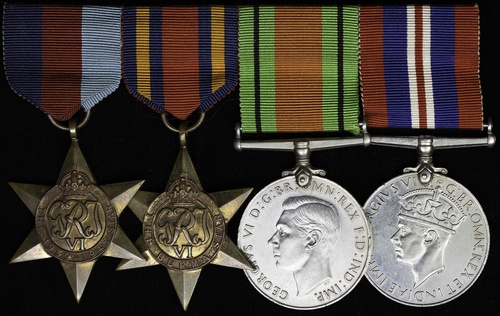
Auction: 24113 - Orders, Decorations and Medals - e-Auction
Lot: 568
The campaign group of four attributed to Captain W. F. C Ashmore, 1st Battalion, The King's Own Yorkshire Light Infantry, attached 8th Gurkha Rifles, who was Killed in Action on 20 February 1944 whilst commanding 'A' Company 8th Gurkha Rifles to relieve the besieged 'Admin Box' in the Arakan
1939-45 Star; Burma Star; Defence and War Medals 1939-45, all privately engraved 'Capt. W. F. C. Ashmore 1/KOYLI', sold together with a named school boxing medal, very fine (4)
William Frederick Caldwell Ashmore was born on 21 March 1919 in India, the son of Major E.J.C. Ashmore, D.S.O., M.C. He was educated at the Imperial Service College and commissioned in The King's Own Yorkshire Light Infantry on 18 February 1940. Ashmore was advanced to War Substantive Lieutenant on 18 August 1941 and subsequently attached to the 1st Battalion, 8th Gurkha Rifles with whom he was serving when he was killed in action on 20 February 1944.
The History of the 8th Gurkha Rifles in the Operations to Relieve the Admin Box compiled by Lt. Col. H.J. Huxford, O.B.E., takes up the story:
'The Battalion moved off and established a ''firm base'' at the foot of the Mayu range about twelve miles south of Bawli. Though not shown on any map, the name as pronounced of this spot is ''Petawang-a-wang-a-what-a-tit''. It would be interesting to have a gramophone record of pronunciations of Arakan placenames as interpreted by the troops, British, Indian and Gurkha. No wonder the Ngakyedauk pass became familiarly known as "Okey Doke" pass.
On meeting the G.O.C., 36th Division, it was discovered that their defence platoon was provided by the 8th Gurkha Rifles Regimental Centre. The platoon commander, Jemadar Birta Sing Gurung, I.0.M., I.D.S.M., was with General Festing. After collecting porters, guides, rations, etc., the advance began. The guides were most unreliable and were dispensed with. Companies moved on compass bearings, and finally the whole Battalion was firmly established on top of the range. The porters were not warlike and fled at the first shot exchanged with a Jap patrol at a point known as Jap Pass. On 26th February 1944, the flank of a strong enemy position was located. In this affair ''A'' Company became engaged, and lost their commander, Captain W. F. C. Ashmore, killed, and Jemadar Tekbahadur wounded.'
Huxford states that Ashmore was killed on 26 February 1944 which is at odds with the C.W.G.C, which gives his date of death as 20 February 1944. Interestingly, in a newspaper clipping informing of his death, his parents stated, 'twice wounded he continued to lead his men until killed outright'.
Ashmore was initially buried at the Akyab War Cemetery in the Arakan, however in May 1952 his body was exhumed and re-buried in the Taukkyan War Cemetery;
Sold together with copied research, a school list and a school boxing medal engraved on the reverse 'I.S.C. 1932, 5 st., Winner, W.F.C. Ashmore'.
Subject to 20% VAT on Buyer’s Premium. For more information please view Terms and Conditions for Buyers.
Sold for
£140
Starting price
£100




